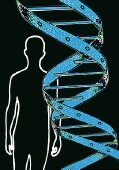 |
 |
 |
||
    |
||||
|
||||

Genetic Test for Heart Disease Risk in the Works
International studies lay groundwork for designing way to spot susceptible patients|
|
HealthDay
Monday, February 9, 2009
 SUNDAY, Feb. 8 (HealthDay News) -- Perhaps five years from now, you might actually hear your doctor casually say, "While we're at it, let's do a blood test to see if your genetic makeup puts you at high risk of having a heart attack."
SUNDAY, Feb. 8 (HealthDay News) -- Perhaps five years from now, you might actually hear your doctor casually say, "While we're at it, let's do a blood test to see if your genetic makeup puts you at high risk of having a heart attack."
So says Dr. Sekar Kathiresan, an assistant professor of medicine at Harvard Medical School and director of preventive cardiology at Massachusetts General Hospital. He is the leader of a group that has identified three new genetic variants associated with an increased risk of heart attack.
That finding, which brings the total of such risk-associated variants to nine, is reported in the Feb. 8 online issue of Nature Genetics. The journal highlights a total of five papers from groups around the world looking at the genetics of heart disease.
The study led by Kathiresan, done by a group of six organizations called the Myocardial Infarction Genetics Consortium, is the largest of the five. It compared the genomes of about 3,000 people who had suffered heart attacks relatively early in life -- under 50 in men, under 60 in women -- with those of 3,000 people who hadn't had a heart attack.
It's known that heart disease tends to cluster in families, Kathiresan said, in part because family members tend to share bad habits, such as smoking. The aim of the study was to single out the role of genes in increased familial risk.
"We looked at about 1 million different spots in the genomes, the frequency of the letters in the genomes in cases and controls," Kathiresan said. "The genome-wide study identified nine spots associated with an increased risk of heart attack, six of which had been previously described. We showed that when you combined the information from the nine different spots, the 20 percent of the people who had the most unfavorable profile had a 2.25-fold greater risk of having a heart attack, compared to the 20 percent with the best genetic profile."
Work needs to be done before this information can be put to medical use, he said. "We must test this panel in other studies," he said. "If the results hold up, it will be worth doing tests in clinical situations."
Such a genetic test would not be a big deal compared to tests now done routinely, Kathiresan noted. "It would be no more expensive than the standard tests that are done to measure blood cholesterol levels," he said.
Such a test "could be useful in guiding treatments, such as who should get statins at an early age to lessen LDL cholesterol levels," Kathiresan said. Meanwhile, research is being done to learn how these genetic variants increase heart attack risk.
"Of the nine, three seem to be acting through LDL cholesterol," Kathiresan said. "One gene region seems to directly increase the risk of build-up of atherosclerotic plaque in heart arteries."
The four other studies in the journal indicated that a heart attack risk test would not be limited to those nine genes. A report from France described an association with clusters of variants of three genes on chromosome 6. A Japanese study found an association with a gene, designated BRAP, that may be involved in inflammation. Researchers in Iceland identified five genetic variations governing the blood cells called eosinophils, which also play a role in inflammation. A German study described a gene that is highly expressed in the cardiovascular system and might be involved in the adhesion of cells to one another.
"We know that this is not the end," said Jeanette Erdmann, a professor of genetics at the University of Lubeck, and lead author of the German report. "It is hard to predict how many loci you might find."
Such tests probably wouldn't be used in childhood, Erdmann said. "But I can imagine a 30-year-old man with a family history of heart disease having one," she said. "It would be good for him to get a test of these genetic variants and find out if it is important to modify the other factors that lead to heart disease, such as obesity and high blood pressure."
A next step for the German group, which collaborates with the French researchers, is to do "some kind of meta-analysis of the genome," Erdmann said. "It will be an analysis of 15,000 cases and 15,000 controls," she said. "We have started doing it."
HealthDay
Copyright (c) 2009 ScoutNews, LLC. All rights reserved.
Related News:
More News on this Date
Related MedlinePlus Pages:
| Home | Health Topics | Drugs & Supplements | Encyclopedia | Dictionary | News | Directories | Other Resources | |
| Disclaimers | Copyright | Privacy | Accessibility | Quality Guidelines U.S. National Library of Medicine, 8600 Rockville Pike, Bethesda, MD 20894 National Institutes of Health | Department of Health & Human Services |
Date last updated: 10 February 2009 |
